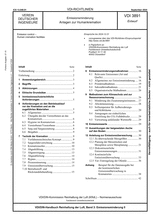Standards Worldwide
Standards Worldwide
Phone +49 30 58885700-07

Draft technical rule
VDI 3891:2024-09 - Draft
Emission control - Human cremation facilities
- German title
- Emissionsminderung - Anlagen zur Humankremation
- Publication date
- 2024-09
- Original language
- German
- Pages
- 46
- Publication date
- 2024-09
- Original language
- German
- Pages
- 46
Product information on this site:
Quick delivery via download or delivery service
Buy securely with a credit card or pay upon receipt of invoice
All transactions are encrypted
Short description
The number of cremations is steadily increasing. In Germany, they already account for over 70 per cent. There are currently almost 200 human cremation facilities in Germany run by municipal or private operators, which can have a non-negligible impact on people, the environment and the climate. In order to avoid or minimise these effects as far as possible, the standard describes the current state of process technology for cremation plants as well as measures to avoid and minimise these possible harmful effects. In addition to the purely technical requirements, it also deliberately takes ethical principles into account. In addition, it provides specific metrological instructions for monitoring the plant in accordance with the 27th BImSchV. The following aspects in particular were taken into account in the current revision:• recommendations for compliance with and monitoring of the CO limit value• recommendations for optimised and environmentally friendly operation• measures to conserve resources and protect the climate• the latest findings on temperature reduction in the afterburning zone• requirements for coffins, coffin equipment and grave goods• the latest findings on handling deceased persons contaminated with radioactive substances • options for reducing and limiting mercury emissions• effects of the buried ashes on the soilThe standard is equally a working tool for building owners and operators, planners and contractors, manufacturers and purchasers of coffins and funeral accessories, supervisory and monitoring bodies as well as testing institutions and authorities. It is an important source of information for the planned amendment of the 27th BImSchV.
Content
Show contents (de)
ICS
13.040.01
Also available in
Loading recommended items...
Loading recommended items...
Loading recommended items...
Loading recommended items...
